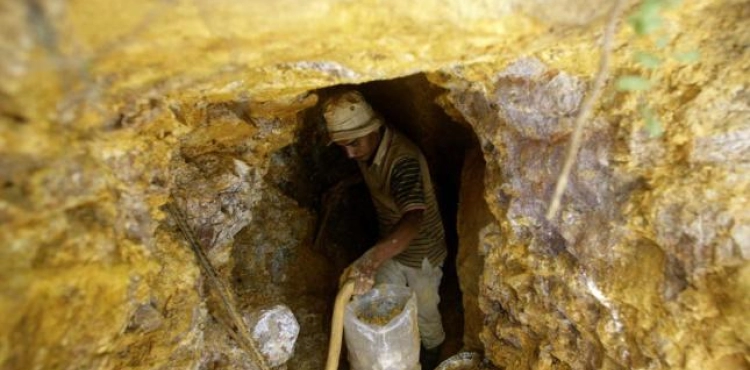Indonesians, fed up with the emerging corona virus crisis, do not hesitate to risk their lives in search of gold in random mines following the sharp rise in the prices of this precious metal.
In light of the economic crisis sparked by the Covid-19 epidemic, investors from around the world flocked to buy gold, outbidding its prices.
This led to the strong demand for the precious metal, which is considered a safe haven in times of crisis, to the price of gold exceeding the threshold of two thousand dollars per ounce, for the first time in August.
In Indonesia, this record rise has reflected a rush to illegal gold mines, despite the many risks involved in these activities, including the risk of arrest, stray bullets, mercury poisoning, or accidents.
Mustafa spends his day as hundreds of other prospectors in the mine in Karr and fled with the security forces in Papua province, in the far east of Indonesia.
With his colleagues, this father of two is searching for gold crumbs in a river near the Grasberg Mine, one of the largest gold mines in the world run by the American "Freeport" group.
At best, Mustafa collects a gram of gold, purifies it from the mud with a piece of cloth, and sells his produce to a local merchant for about 800,000 rupees (about 50 dollars), which is not a small amount in this region, which is one of the poorest in the country.
He confirms that mercury is not used here, but that other risks are beset by them.
They may be arrested at any time or caught in the crossfire between security forces and separatist rebels, who have clashed with the authorities from time to time for decades in the region.
"Our number has increased since the outbreak of the epidemic with the rise in the price of gold," Mustafa said in a phone call to Agence France-Presse.
He added, "We may be arrested, but we have no other choice. We need to secure sustenance for our families."
Through this painstaking work, they may also face the risk of contracting the Coronavirus or disease caused by toxic pollutants in the waters coming from the nearby industrial mine.
Mustafa says, "It is a great danger to our health. I, as my friends, suffer from skin diseases. But thank God that no one has been infected with the virus until this hour."
On Borneo, thousands of kilometers away, police this month arrested nearly 400 workers accused of exploiting illegal mine resources in a protected area. They could face up to 15 years in prison.
Mercury exposes workers and the environment to severe dangers at this site, says Socio Eriono, in charge of forest protection at the Environment Ministry.
He points out that "the recent wave of arrests ... shows widespread illegal activities."
Despite the absence of official statistics, the official asserts that the exploitation of informal mines is increasing dramatically, including on the most populous island of Java and vast Sumbawa.
"It is the high price of gold that motivates ... this illegal activity. They are making profits by harming the environment. We are trying to find solutions to settle the situation," he explains.
And environmental activist Ayesh Rombakan points out that the "drastic increase" in random mines is the result of the attempt by those who have been hard-pressed after losing their work due to the Corona virus crisis to secure the needs of their families at any cost.
"These prospectors often use mercury to speed up the process, which causes environmental damage" to the relevant area, rivers and lakes, says the director of the Wolhi Environmental Association in Papua.
And he warns of "the consequences of an environmental disaster."
Indonesia banned the use of mercury in 2017 in non-industrial mines. However, it is possible to obtain this mineral, which affects the nervous system and leads to birth defects on the black market.
These small-scale mines are the source of livelihood for more than a million Indonesians, according to the United Nations Development Program.












